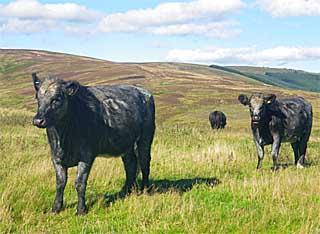EPIC - The Scottish Government's Centre of Expertise on Animal Disease Outbreaks
Published on 17 October 2013 in Sustainability and Communities , Food, health and wellbeing

Introduction
Rapid change is altering livestock disease risks in Scotland so it is essential that we monitor the situation and offer timely policy advice to the Scottish Government.
The overarching purpose of EPIC is to provide access to high quality advice and analyses on the epidemiology and control of animal diseases that are important to Scotland and to best prepare for the next major disease incursion.
Ultimately, this strategic advice will help ensure that the interests of the stakeholders involved in disease emergency planning and response are met as effectively as possible.
Key Points
EPIC aims to achieve its purpose through:
- Delivering timely and accurate advice.
- Testing and refining communication and response mechanisms to enable effective response in an emergency.
- Co-ordination of the research, analysis and interpretation that is undertaken on animal disease outbreaks.
- Stimulating innovative thinking in support of policy development and implementation.
- Developing a programme of knowledge exchange in order to ensure the effective underpinning of policy as well as the wider dissemination of knowledge.
Research Undertaken
Module 1: Co-ordination, Contingency and Communication
The focus is on disease control policy in both outbreak and inter-epidemic periods which requires planning, risk assessment and investment in infrastructure. Specific examples include:
- foresighting and risk assessment approaches in both “peace” and “war time”
- communications infrastructure and agreed roles and responsibilities
- policy ready interfacing for disease management
- development of a tool box to access modelling resources most efficiently.
Activities include the production of a library of disease outbreak scenarios, the provision of an early warning system/report to the Chief Veterinary Officer, the creation of a disease control infrastructure and a virtual control HQ. We are looking at ways to integrate work on disease outbreak phylodynamics conducted by EPIC with conventional epidemiological output including development of an epidemic modelling “resource toolkit”.
Module 2: Animal Movements and Risks
GB livestock movements and demography are exceptionally well characterised and will be further improved with the adoption of electronic identification (EID). Properly analysed, these data provide an excellent platform from which to base the control of infectious diseases of livestock.
To achieve this, animal movement data and relevant data from other sources must be synthesised, augmented and validated. Different types of movements involve different risk, depending on which disease is being evaluated.
We are now creating a definitive version of animal movements and demographic databases for Scotland in the context of GB, and provide advice on their updating and development. We are also quantifying the relationships between pathogen transmission and livestock movements using a phylodynamics approach. These methodologies are being applied in detail to an exemplar disease that is the subject of a nationwide eradication campaign (Bovine Viral Diarrhoea Virus - BVDV), as this will inform model development for both endemic and exotic diseases.
Module 3: Disease Control Options
The overall approach is to integrate skills from relevant disciplines to deliver the best holistic advice to Scottish Government policy staff on control options for nominated livestock diseases at any particular point in time. The cost/benefit analyses tools and models for economic analyses of disease control options that were initiated through the current Scottish Government Programmes of Research are being further developed.
Through engagement with appropriate stakeholder groups we are using social science approaches to determine the likely basis for and drivers of disease control actions in response to an outbreak both now and in future scenarios. This qualitative approach is then integrated with quantitative economic data. We will develop the web-based interface used by veterinary surgeons and farmers reviewing endemic diseases to include an exotic disease interface for policy makers.
Module 4: Forecasting and Horizon Scanning
The method used as a focus for interdisciplinary collaboration is Scenario Planning, a qualitative approach to structured medium-to-long term strategic thinking which nevertheless incorporates uncertainty in expert opinion.
This work is being underpinned by economic modelling, to provide a framework to assess the impact of changes on the performance of the livestock industry in a national and international framework; Quantitative Risk Analysis (QRA), a suite of methods which provide a framework to integrate quantitative information and quantify outcomes; and statistical analysis, to make best use of the data.
Module 5: Knowledge Exchange
EPIC is developing, implementing and embedding a Knowledge Exchange (KE) Strategy for all its work, recognising the effective provision of information and advice to a wide range of stakeholders is critical its success.
The KE Strategy is being developed using the communications planning framework set out in the overarching Knowledge Transfer/Exchange (KTE) Strategy for the RESAS Research Programme 2011-2016. An expert Steering Group for EPIC as agreed with Scottish Government and a Knowledge Exchange Advisory Committee (KEAC) have been established.
The Centre also organises Annual Meetings and collaborations with third party researchers and government agencies, Defra, AHVLA and a wide range of stakeholders.
Policy Implications
Scotland needs to be prepared to respond to animal disease incursion in a timely and cost-effective way and to have up-to-date policies and response structures in place to achieve this. The work of EPIC is to address this challenge through partnership working with Scottish Government and a wide range of industry and public stakeholders.
Partners
- SRUC (Scotland's Rural College)
- Centre for Infectious Diseases, University of Edinburgh
- Biomathematics and Statistics, Scotland
- The James Hutton Institute
- The Roslin Institute
- College of Medical, Veterinary and Life Sciences, University of Glasgow
- Moredun Research Institute
Authors
Dr Pete Goddard, James Hutton Insitute pete.goddard@hutton.ac.uk
Andrew Grant, SRUC andrew.grant@sruc.ac.uk
Ian Hutchinson, SRUC ian.hutchinson@sruc.ac.uk
Topics
Sustainability and Communities , Food, health and wellbeing







